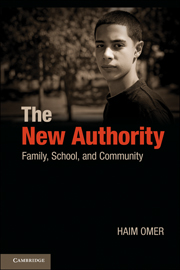Book contents
- Frontmatter
- Contents
- Foreword
- 1 The New Authority
- 2 Vigilant Care
- 3 Children's Violence Within the Home
- 4 Enlisting Support in the School
- 5 Presence and Supervision at School
- 6 Publicity and Reparation
- 7 Involving Students in the Campaign Against Violence
- 8 The New Authority in the Community
- References
- Index
3 - Children's Violence Within the Home
Published online by Cambridge University Press: 05 May 2016
- Frontmatter
- Contents
- Foreword
- 1 The New Authority
- 2 Vigilant Care
- 3 Children's Violence Within the Home
- 4 Enlisting Support in the School
- 5 Presence and Supervision at School
- 6 Publicity and Reparation
- 7 Involving Students in the Campaign Against Violence
- 8 The New Authority in the Community
- References
- Index
Summary
Parents take action against children's violence in the spirit of the new authority when they (a) increase their supervision and presence in response to suspected violent behaviors or overt expressions of violence; (b) react to violent acts with nonviolent resistance and take measures to defend the victim; (c) make reparations to the victim, while attempting to involve the aggressor in the process, thereby allowing him to redefine his place in the family; and (d) mobilize a support network for their actions and for the victim. Recruiting a support network often is a precondition for the success of the previous processes. One of modern society's achievements in the area of domestic violence is the insight that parental violence toward children or men's violence toward women not only is a family's own business but the business of society at large. We believe this to be true of violence toward siblings or parents. Without the involvement of parties outside of the nuclear family it is difficult to deal with such situations successfully and morally.
Most parents prefer to keep their children's violence secret to avoid embarrassing themselves and so that the child not suffer social stigmatization. This is an example of the “privacy reflex,” by which we automatically defend our personal and family lives from public scrutiny. Modern society cherishes pure individualistic values such as authenticity, spontaneity, intimacy, introspection, and self-realization. These values are significant to the spirit of freedom and tolerance but embracing them without reserve may obstruct our ability to see wrongdoing in vital areas such as the use of violence or self-destructive behavior by young people. In his important work The Fall of Public Man, sociologist Richard Sennett (2003) describes the rise of the culture of privacy and the values of intimacy to the point of eradicating entire public spaces from modern life. In this book we are following in his footsteps in our attempt to rectify the absence of a communal-public dimension in parenting and child rearing. We do not believe the phenomenon of juvenile violence inside and outside of the family can be treated successfully unless it is confronted in a communal context.
- Type
- Chapter
- Information
- The New AuthorityFamily, School, and Community, pp. 89 - 120Publisher: Cambridge University PressPrint publication year: 2010



